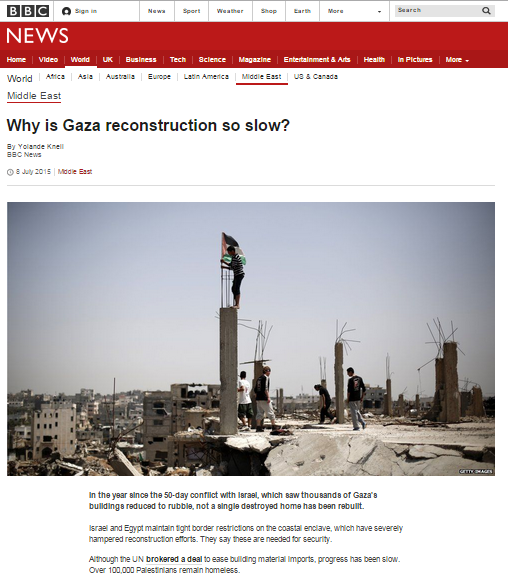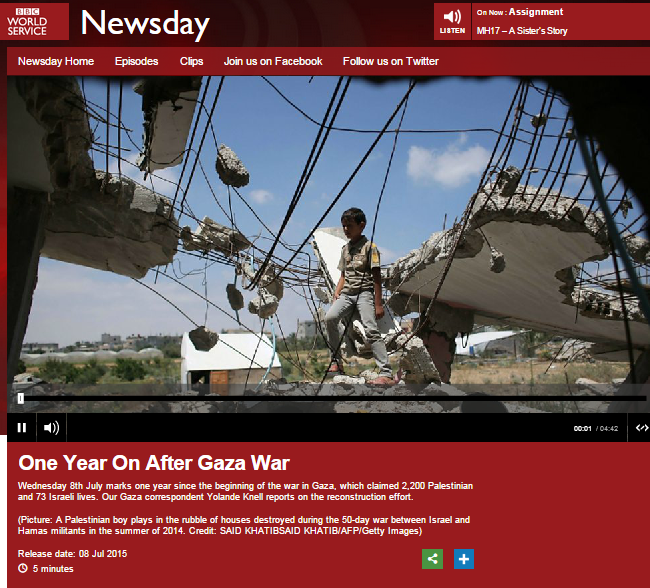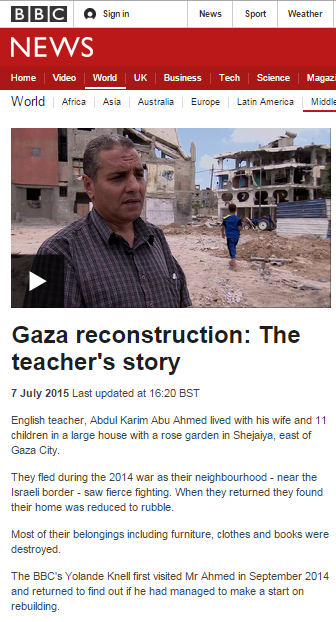The BBC’s extensive coverage of the anniversary of the commencement of Operation Protective Edge included multi-platform contributions from the Jerusalem Bureau’s Yolande Knell which focused on the topic of reconstruction in the Gaza Strip.
That topic has of course already been covered extensively by the BBC throughout the past year – both by Yolande Knell and by others. Examples include the reports highlighted in the following posts:
Reporter in the rubble: what is missing from BBC presentation of structural damage in Gaza?
BBC’s Knell continues the Gaza border restrictions PR campaign
BBC’s ‘reporter in the rubble’ theme gets its own feature
Yolande Knell’s Gaza borders campaign continues on BBC Radio 4’s PM
BBC’s Knell revamps ‘reporter in the rubble’ for promotion of a political agenda
BBC’s Lyse Doucet does ‘reporter in the rubble’ redux – part three
So did Knell have anything new to contribute to BBC audiences’ understanding of the topic of reconstruction in the Gaza Strip in her filmed, audio and written reports which appeared on July 7th and 8th?
The opening lines of the written report – which appeared in the ‘Features’ section of the BBC News website’s Middle East page on July 8th under the title “Why is Gaza reconstruction so slow?” – include clear signposting.
“In the year since the 50-day conflict with Israel, which saw thousands of Gaza’s buildings reduced to rubble, not a single destroyed home has been rebuilt.
Israel and Egypt maintain tight border restrictionson the coastal enclave, which have severely hampered reconstruction efforts. They say these are needed for security.” [emphasis added]
The reason for that signposting is that, like all her many previous reports on this topic, this article too is part of Yolande Knell’s campaigning efforts against the restrictions imposed in order to combat terrorism emanating from the Gaza Strip. Later on in the article, under the sub-heading “Call to lift blockade”, readers are told that:
“Israeli restrictions prevent so-called “dual use” materials from entering Gaza. These include building supplies that could be used by militants to create new tunnels, or weapons and storage sites.” [emphasis added]
In fact the dual-use materials are not – as Knell claims – “so-called”. The list of restricted items is based on the Wassenaar Arrangement on Export Controls for Conventional Arms and Dual-Use Goods and Technologies in which many other countries – including the UK – also participate.
Later on (and also in her audio report) Knell cuts to the chase:
“Ultimately, the UN and international aid agencies continue to call for a lifting of the blockade. They say this is the only way to bring in all the materials needed to repair homes and infrastructure and revive the local economy.”
She makes no effort, however, to inform BBC audiences of the likely consequences for Israelis if the blockade were lifted and weapons and dual-use items flowed freely into the Gaza Strip.
Knell’s portrayal of the mechanism for the distribution of construction materials is as follows:
“To allow reconstruction to take place the UN agreed a temporary Gaza Reconstruction Mechanism (GRM) with the Israeli and Palestinian governments.
This brings in aggregate, steel bars and cement (known as ABC materials) via the Kerem Shalom commercial border crossing.
UN monitors have helped assess housing damage and needs. Full details are kept in a computer database and the Israeli military has oversight of some information.
Palestinian ministries administer lists of individuals cleared to collect materials from approved vendors. So far, about 90,000 Palestinians have been cleared to obtain supplies, mostly for small-scale repairs.”
No information is provided to readers concerning the black market trade in construction materials in the Gaza Strip – and the ensuing fact that buildings which could have been repaired had their residents not chosen to sell their allotted building materials remain a prime photo-op for foreign journalists. As was recently reported in the Times of Israel:
“According to the office of the Coordinator of Government Activities in the Territories, the arm of the Israeli army that coordinates with the Palestinian civilian populatio
n, close to 90,000 owners of those partially damaged homes have already gotten the building materials from the warehouses in Gaza that were set aside for this purpose in order to renovate their homes. […]
But did they all use the building materials for their home repairs? That is a different question entirely. The terrible financial hardship and the lack of jobs are part of this equation. Many of those homeowners sold their construction materials on the black market for a higher price than what they had paid for them with donated funds.
Gaza residents who spoke on condition of anonymity say that the black market for construction materials in the Gaza Strip is growing at a rapid pace because the materials are being sold instead of used for renovations.
According to statistics of the Coordinator of Government Activities in the Territories, Israel has brought 1.3 million tons of construction materials into the Gaza Strip since the end of the war — certainly a respectable amount. The material was intended for repairing homes that had been partially damaged and for rebuilding infrastructure.”
Like her colleague Lyse Doucet before her, Knell does not make any attempt to adequately inform audiences about the tunnels which are being rebuilt by Hamas in the Gaza Strip.
Knell is also taciturn on the real factors contributing to the slow pace of reconstruction.
“The UN Special Co-ordinator for the Middle East, Nikolei Mladenov, says delays have been caused by the huge scale of the task and the slow flow of promised foreign aid.
Renewed divisions between Hamas and the Western-backed Palestinian Authority, which was meant to station its security forces at Gaza’s border crossings, added to complications.”
The link in that last paragraph leads to a pay-walled Ha’aretz article which most readers will not be able to access and therefore will remain unaware that it includes the following:
“A European diplomat familiar with the details of the meetings confirmed that such protest was conveyed. He spoke on condition of anonymity. “They conveyed an unequivocal message that the PA can do more to promote reconstruction in the Strip, and that continued internal political squabbling between Fatah and Hamas are adversely affecting the humanitarian situation in Gaza and the pace and scope of reconstruction,” the European diplomat said. […]
“There is positive movement on the Israeli side in everything regarding Gaza,” the EU diplomat said. “While you always need more, the Israelis are removing hurdles and assisting reconstruction. At the same time, reconstruction is still stuck because of the internal fights on the Palestinian side, Egyptian behavior and failure to deliver funds pledged by the Arab states.”
All three of Knell’s reports include interviews with the Shuja’iya resident Abdul Karim Abu Ahmed whom she has also interviewed on at least two prior occasions over the past year. As was the case in the previous content she produced, no effort is made to inform audiences why the English teacher who claims to have been “shocked” and that he “didn’t expect to see my house, my street [….] destroyed like this” is being disingenuous.
As was noted here back in September 2014:
“As can be seen from the IDF’s aerial map of the neighbourhood, at least five missiles were fired from close proximity to Abu Ahmed’s house and yet Knell neglects to inform listeners of that fact and amplifies his feigned surprise at the consequences.”
Knell closes her written report with the following words:
“Without long-term political solutions to solve Gaza’s underlying problems, many warn of social unrest, instability and the increased risk of further hostilities.”
Gaza’s underlying problem is of course that it was taken over by a terrorist organization in a violent coup in 2007 and that foreign funded terrorist group and others continue to wage war on its neighbours. Somehow, though, one doubts that is what Yolande Knell intended her readers to understand.
The fact that none of these three latest reports by Knell bring any new information or insight to BBC audiences who have seen, read and heard countless similar ones in the past twelve months raises questions about the editorial considerations behind their production and broadcast. Obviously, these reports are not an attempt to report news or to provide audiences with a comprehensive, accurate and impartial “understanding of international issues“. What they are is the latest installment in Yolande Knell’s BBC endorsed political campaign to influence public opinion on the issue of the border restrictions on the Gaza Strip made necessary by the terrorism she never mentions.
Related Articles:
BBC ‘Gaza war anniversary’ coverage continues to mislead on the causes of the conflict
Resources:
